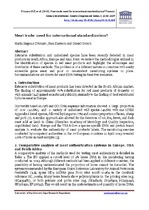| dc.contributor.author | D’Amato, María Eugenia | |
| dc.contributor.author | Davison, Sean | |
| dc.contributor.author | Corach, Daniel | |
| dc.date.accessioned | 2017-09-05T08:22:33Z | |
| dc.date.available | 2017-09-05T08:22:33Z | |
| dc.date.issued | 2013 | |
| dc.identifier.citation | D'Amato, M.E. et al. (2013). Meat trade: need for international standardization? Forensic Science International: Genetics Supplement Series, 4: e328–e329 | en_US |
| dc.identifier.issn | 1872-4973 | |
| dc.identifier.uri | http://dx.doi.org/10.1016/j.fsigss.2013.10.168 | |
| dc.identifier.uri | http://hdl.handle.net/10566/3172 | |
| dc.description.abstract | Extensive substitution and undeclared species have been recently detected in meat products in South
Africa, Europe and Asia. Here we review the methodologies utilized in the identification of species in red
meat products and highlight the advantages and drawbacks of these methods. The problem is of a
different nature in countries with easily accessible game meat and poor or nonexistent monitoring
systems in place. Recommendations are drawn for meat DNA testing in these two scenarios. | en_US |
| dc.language.iso | en | en_US |
| dc.publisher | Elsevier | en_US |
| dc.rights | http://dx.doi.org/10.1016/j.fsigss.2013.10.168 | |
| dc.subject | Meat | en_US |
| dc.subject | DNA test | en_US |
| dc.subject | Meat authenticity | en_US |
| dc.subject | Species identification | en_US |
| dc.title | Meat trade: need for international standardization? | en_US |
| dc.type | Article | en_US |
| dc.privacy.showsubmitter | FALSE | |
| dc.status.ispeerreviewed | TRUE | |
| dc.description.accreditation | Web of Science | |

